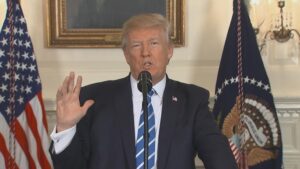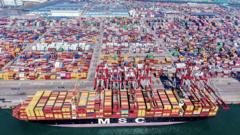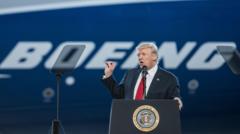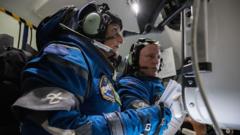The Trump administration has initiated a review of imported commercial planes, jet engines, and parts, raising the possibility of introducing additional tariffs.
U.S. Launches Probe into Foreign Aircraft Imports Amid Tariff Discussions

U.S. Launches Probe into Foreign Aircraft Imports Amid Tariff Discussions
Investigation could pave the way for new tariffs on imported aviation components affecting the aerospace industry.
The Trump administration is undertaking a significant investigation into the importation of commercial aircraft, jet engines, and associated parts, a move that could potentially result in new tariffs, complementing existing trade measures. Announced through a federal notice last Friday, the inquiry led by Commerce Secretary Howard Lutnick commenced on May 1 under the Trade Expansion Act, which allows the President to impose trade tariffs for national security reasons.
In prior instances, President Trump has utilized this authority to implement tariffs on aluminum and steel while launching similar inquiries into product sectors like semiconductors and pharmaceuticals. As part of the new investigation, the Commerce Department is soliciting input from industry stakeholders regarding domestic demand for aircraft and components, the contributions of foreign suppliers, and the influence of foreign government policies on their practices.
While the aerospace industry has long enjoyed a substantial trade surplus—expected to reach $125 billion this year—the sector heavily relies on a global network of specialized suppliers. Many critical components are produced by limited manufacturers, which raises concerns about the potential negative impact of new tariffs on this vital industry.
Eric Fanning, president of the Aerospace Industries Association, highlighted the industry's role as a cornerstone of the American economy, known for its trade surpluses, job creation, and technological innovations. He expressed eagerness to work with the Department of Commerce on identifying ways to bolster the domestic supply chain while preserving the trade structures that sustain U.S. leadership in aviation.
Major aerospace companies like Boeing have reported only minor immediate effects from the tariffs, although they warn of potential repercussions on their supply chains. Boeing's CEO, Kelly Ortberg, indicated that they face 10 percent tariffs on parts from Japan and Italy, which they anticipate recovering through aircraft sales. In contrast, RTX, which manufactures engines and parts, projected annual tariff-related costs to reach around $850 million, while GE Aerospace expects similar expenses of approximately $500 million.
Historically, countries have sought to protect their aerospace sectors through tariffs and subsidies, leading to prolonged disputes between the United States and the European Union over alleged unfair assistance to Boeing and Airbus—the latter being based in France and operating across Europe. In a notable resolution in 2021, both regions ended a lengthy 17-year subsidy dispute, instead collaborating to counterbalance China's growing influence in key industrial segments.
Niraj Chokshi continues to report on aviation, rail, and related transportation sectors, offering crucial insights into the ongoing changes in U.S. trade policies affecting the aerospace industry.























